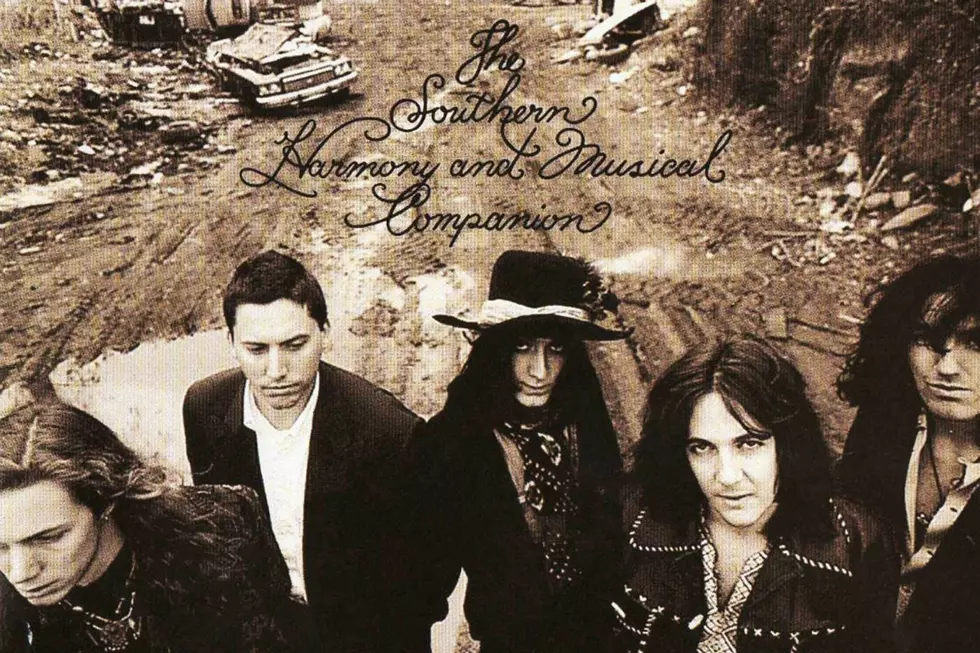
25 Years Ago: The Black Crowes Make Their Debut With ‘Shake Your Money Maker’
Remember the '90s? You know, the era of awesome grunge and alternative bands, the ska and punk revivals, all that good stuff. True, all of that great music happened, but if that's how you remember the '90s, you probably weren't there.
In the first month of that decade, Phil Collins and Milli Vanilli shared the top spot on Billboard's album chart. Right on their heels stood Paula Abdul, MC Hammer, and New Kids on the Block; in fact, in 1990, no rock album ever hit No. 1. The closest we came was Bonnie Raitt's blend of MOR and blues.
These were bleak times for fans of blues-based rock with a little R&B hip shimmy. The Faces' Rod the Mod was now schmaltzy Rod 'Downtown Train' Stewart. The Rolling Stones' 'Exile' days were long past. Nobody even knew who Humble Pie or Stax Records were, or what a Hammond organ sounded like. Velvet jackets and denim flairs were long gone, replaced by Spandex and headbands.
And then they strutted onto the scene all gravelly and gritty, like they'd been up all night jamming with Booker T. and the M.G.'s: The Black Crowes. I literally got out of my chair and shook my money maker when this clip premiered on MTV:
The Robinson brothers, Chris and Rich, had been in the Black Crowes business for a half dozen years prior to their debut album's release. In 1984 the duo formed Mr. Crowe's Garden while still attending high school in Marietta, Georgia. The peach state was ripe with hometown influences for the young brothers -- Otis Redding, R.E.M., even their father Stan, who recorded an early rock and roll cut, 'Boom-A-Dip-Dip,' in 1959.
In 1988, about a year after the above clip was filmed, the band signed to Rick Rubin's newly formed Def American Recordings and changed their name to the Black Crowes. They began recording 'Money Maker' in mid-1989 with some heavy duty legends, including Chuck Leavell, who played keyboards for both the Allman Brothers and the Rolling Stones, Brendan O'Brien, who has worked as producer, engineer, or session player for pretty much anyone you care to name, and singer Laura Creamer, who counts Bob Seger, Eric Clapton and Van Morrison among her credits.
All songs on the album were credited to the Robinson brothers with exception to their cover of Otis Redding's 'Hard to Handle.' Lead single 'Jealous Again' barely cracked the Top 100, but even No. 75 must have been a thrill for a band playing a style of music that the industry had all but ignored for nearly 15 years.
But it was the follow-up single that exploded. I wasn't the only one out of my seat when 'Hard to Handle' hit the airwaves. Music lovers were hungry for an authentic sound, and ironically the Black Crowes provided just that with a cover tune. 'Handle' went Top 30, and the accompanying album blew up. In less than a year of its release, 'Shake Your Money Maker' went platinum.
Not everybody was thrilled, though. Village Voice writer Robert Christgau gave the album his lowest rating. Regarding the band's follow-up in 1992, the critic was a bit more verbose:
Nothing wrong with mixing up a blues-based mush of Stones and Faces and Allmans and whoever, especially when you come by your influences naturally and don't imitate any of them. So of course these youngsters are "original" enough. What they're not is good enough. After all, the Faces and the Allmans weren't such hot songwriters either, and their heirs don't exactly have a Young Rod or a Gregg-and-Dickey to compensate.
What the old guard failed to understand is that nobody had a "Young Rod" Stewart anymore. Chris Robinson's hoarse wail and brother Rich's nasty guitar were the remedies for what was ailing us. 'Money Maker' was the tonic for a decade of keytars, gated snares, and power ballads.
Not that the album was without its tender moments. 'She Talks to Angels,' a track dating to the Mr. Crowe's Garden days, was the song that launched a million Bics and inspired as many front porch guitarists:
Rumors spread that the song was about a friend of Chris Robinson's who dealt with drug problems, but years later the singer told Songfacts:
'She Talks to Angels' is a funny song in that so many people resonate with it. The dark details like drugs and things like that would be a part of growing up and being in this world, but when I wrote that song I had no idea - I hadn't done any of those things. I hadn't lived that - everything was in my imagination.
'Sister Luck,' 'Seeing Things,' 'Could I've Been So Blind' -- there's not a single track of filler on the entire album. 'Money Maker' became Def American's first true hit, eventually selling over 5 million copies.
The Black Crowes would go on to record nine studio albums over their contentious career, all while entertaining side projects, a revolving door of players, and battles between the Robinson boys comparable only to the epic fights between the Kinks' Ray and Dave Davies. Just a few weeks prior to the 25th anniversary of their debut album, the band announced that they were calling it quits.
All nine albums deserve a place in your stacks, but none more so than 'Shake Your Money Maker,' which captures the Black Crowes at their raw, raunchy best.
More From Diffuser.fm

![Chris Robinson Discusses New Music + Gathering Inspiration at Mountain Jam [VIDEO]](http://townsquare.media/site/443/files/2016/06/Chris-Robinson.png?w=980&q=75)







